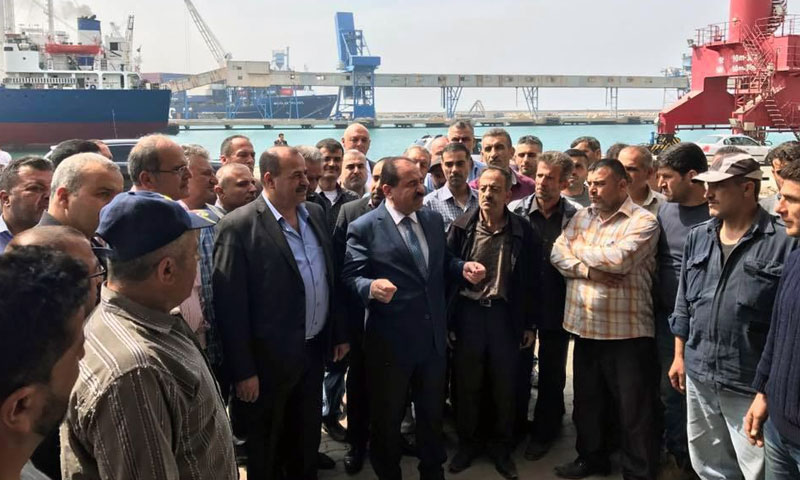



The Syrian regime has announced its profits and losses from contracts signed with Russian investment companies. While the government has made public its revenues and expenditures, most of the contracts’ details remain unknown. Moreover, it is unclear how Russia’s investments have affected workers.
In the past months, Russian companies began preliminary measures to implement these investment agreements. The first measure has aimed to create new employment contracts, which could lead to worker dismissal and layoffs. This is due to the difference between Russia and Syria in terms of the number of workers needed in these sectors, as well as the specific labor laws in the Russian public and private sectors.
Russian companies concluded several investment contracts in Syrian in various sectors including gas, oil, reconstruction, and agriculture, in addition to investment in Syrian ports on the Mediterranean Sea. The most prominent investment contract is in the port of Tartus, where the Syrian regime agreed to a 49-year contract with a Russian company in April 2019. The announcement has raised many questions about the type of contract signed with the Russian firm—whether it is a lease, investment, or operation—and about the fate of thousands of port workers. Despite assurances by the Syrian Minister of Transport, Ali Hammoud, to preserve the jobs of existing workers, it appears that this may not be the case as the Russian firm STG Engineering officially began its work on 9 October.
Al-Watan newspaper, a publication close to the Syrian regime, reported on 24 October on a rising conflict between existing workers at the port of Tartus and the Russian investor, STG Engineering. The newspaper claimed that one of the private companies contracted by STG Engineering met with the port worker to make them sign new employment contracts in place of the old contracts. Workers complained about this for fear of dismissal or layoffs.
The head of the port union, Fouad Harba, told the newspaper that “the union is against this procedure, and strongly opposes it and asked workers not to sign any new contracts.” He added that, “the city’s labor union was sent a memo to the effect: Article /2-2-6/ of the contract stipulated the commitment of the investing company to use and maintain the existing labor force at Tartus port.”
“We were surprised by the invitations of the Russian company to hold meetings in the presence of a representative from Sada company. The meetings aimed to conclude employment contracts with workers under Law No. 17 of 2010, which regulates private sector workers,” Harba said.
According to Harba this “was not permissible. So, the union demanded to continue applying the basic law of the state to all temporary and permanent workers in the General Company for Tartus Port.” He said that the Russian company was not entitled to create such contracts nor to engage an intermediary company in the investment, adding that its procedures are illegal, causing many problems with the workers.
This all came after the investment contract was signed between the state-owned General Company for Tartus Port and the Russian STG Engineering. One of the maritime transport workers at Tartus port noted that the Russian committee studied the situation of the port, and the main uses were employment and the development of infrastructure.
Russia Today (RT) quoted a Russian expert as saying that the port needs to be rehabilitated, and the infrastructure was not ready. Moreover, the port employs more workers than similar-sized ports. According to the Russian expert the port of Novorossiysk in Russia employs 600 workers while the port of Tartus has nearly 5,000 workers. He added that “after probing the employment situation in the port, there are 6 times more workers than necessary.”
The status of the workers was already the subject for dispute between the Russian investment company and the port management during the contract negotiations, according to the expert. He noted that several solutions were suggested. For instance, they agreed to keep 36 percent of the workers in the port, and to transfer the rest to other government bodies, or to arrange early retirement for some workers.
These steps to downsize employment in the port of Tartus resemble the ones taken by the Russian Stroytransgaz Company which took over a fertilizer company in the province of Homs under a contract with the Syrian regime.
After that, the management of the company downsized the number of employees and laid off at least 1200 employees. Yet the government transferred them to other institutions and factories. On the other hand, the Russian company opened up opportunities for the dismissed and retired personnel to work on a contractual basis.
Abu Samer, an employee in the general fertilizer company, said earlier to Enab Baladi that “after the Russian company took over the fertilizer company, it monitored the workers and determined who is eligible to continue working with them and who is not. The Russian company asked us to communicate with our former co-workers, telling them that they can return to work in the company on a contract basis.”
Nasser, a worker from al-Rastan who was dismissed from the company, confirmed that his co-worker told him he could return to the company with a three-month renewable contract, and a salary of 80,000 Syrian pounds (SYP), equivalent to 125 US at the exchange rate of 640 SYP, including the costs of transportation and medical care.
Nasser pointed out that the Russian company gives assurances to the former employees that the Syrian security branches have nothing to do with them and there is no need to obtain security clearance.
if you think the article contain wrong information or you have additional details Send Correction